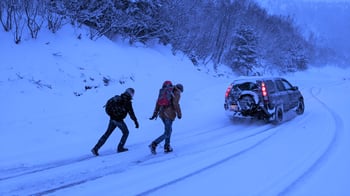In Cape Breton, NS, a collaborative called the Transportation Innovation Lab has devised transportation solutions to help people living on low income get to school and work at affordable rates and from accessible locations.
The collaborative comprises community organizations and different levels of government, as well as private businesses.
 Making life accessible
Making life accessible
Lack of accessible affordable transportation is a key contributor to creating and reinforcing poverty as well as a key poverty reduction strategy. Transportation makes other important aspects of life accessible: work, school and/or training, groceries, pharmacies, sports and recreation, social connection, and more.
Accessible and affordable transportation is a high-impact poverty reduction strategy in CBRM. A Community Transportation Working Group study found in 2016, after news of transit budget cuts was released, that Cape Breton is characterized by high levels of poverty and low accessibility to transportation, and that employers already had difficulty filling job vacancies while transit users had difficulties getting to work.
The CBRM unemployment rate was more than double the national average in 2016 at 17.4% while Canada’s average was 7.7%.
Two years following the community report, the Transportation Innovation Lab was launched to explore whether these gaps for employers and potential employees could share the same high-impact solutions.
Affordable transit the urban centre
The CBRM community’s approach to transit is two-fold due to being an urban-rural mixed environment.
First, the United Way of Cape Breton’s advocacy for and administration of a free bus pass pilot program has been most beneficial to low-income individuals living in the largest CBRM urban centre, Sydney, to get to school, work or training, making transit affordable.
This program distributed 168 six-month passes from 2017 to 2021 and specifically targeted to low-income individuals in the community.
United Way Cape Breton’s research on the pilot program revealed that the bus pass was successfully helping these participants get people to school, work and/or training programs. Then, during COVID-19, as United Way Cape Breton was adapting the program to ensure residents continued to have access to transit, they determined that because paper documentation to prove a rider’s low-income status created another barrier during lockdowns, and most public transit users were all eligible (i.e., living on low-income), income eligibility barriers for getting a free bus pass were removed and replaced with a simple question about a user’s income range.
Accessible, affordable transit in rural CBRM
Rural communities have increasingly opted for point-to-point transit solutions such as on-demand buses, volunteer drives or partnerships with Uber. Rural areas characterized by low population density make the viability of a bus route difficult to plan and sustain operating costs.
Despite Uber and Lyft not operating in Nova Scotia until 2020, CBRM is home to 10 taxi companies, all of whom agreed to take part in the Transportation Innovation Lab. Led by Common Good Solutions, United Way Cape Breton, Nova Scotia’s Department of Community Services as part of their Poverty Reduction Strategy and a local advisory group, the Lab tested two different models that would offer user fees at $4–7 per ride.
The collaborative found that partnering with social service agencies to plan routes, manage changes and subsidize rides was more effective than one project coordinator taking on all tasks. They also found that this model was most effective for users and viable for taxi owners and government funders when it linked up with the free bus pass program to take riders to their final destination.
Impacts of the partnerships with taxi services
Impacts for participants of the taxi pilots included the following:
- 81% were able to take more shifts at an existing job.
- 57% were able to develop additional savings.
- 48% were able to purchase more or healthier foods.
- 38% were able to spend more time with friends and family.
- 33% were able to remain in a job they would have lost because of transportation issues.
- 24% were able to access more recreational and social activities.
- 19% were able to take a new job.
- 14% were able to access more consistent medical care.
- 8% identified they were able to purchase a vehicle during the pilot.
- 5% were able to access new education and training opportunities.
One unanticipated outcome during the COVID-19 pandemic was that the partners found they were helping “essential workers” continue doing their jobs. During shut-downs, ridership to work barely decreased. Many were employees of big box stores, chain restaurants, hospitals and convenience stores. Taxi companies also credited the program with helping them maintain revenue throughout COVID-19.
“I can now take another shift for work because I don’t have to put out so much now for taxis. I have extra money now for bills and groceries. I am not struggling as much as I was financially.”
– Pilot participant
“It will be easier for me to get jobs with varied hours because I won’t have to worry about transportation if I can use a taxi service after the bus stops running in the evening”
– Pilot Participant
“I believe this was the saviour of taxis during lockdown times”
– Taxi owner
Sustainability of the program
With the Transportation Innovation Lab striving to scale the initiative and make it sustainable, the partners are aiming to reduce government funding and as well as the initiative’s carbon footprint by linking taxi rides with the bus program more often.
United Way Cape Breton has secured funding for the next phase of the lab, which will bring the taxi-bus-bridged program to 60 individuals receiving Employment and Income Assistance and continue serving those part of the original pilot.





